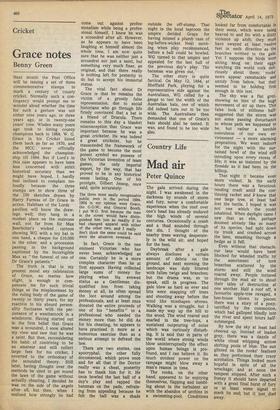Cricket
Grace notes
Benny Green
Next month the Post Office will be issuing a set of three
commemorative stamps to mark a century of county cricket. Normally such a contingency would prompt me to wonder aloud whether the time for such a gesture was not either nine years ago, or three years ago, or in twenty-one years' time. Wisden many years ago took to listing county champions back to 1864; W. G. Grace in his Cricket listed them back as far as 1870, and the MCC never officially acknowledged the championship till 1894. But if Lord's in this case appears to have been less concerned with strict historical accuracy than we might have hoped, I hardly feel inclined to complain too loudly because the three stamps are to show three of the 100 sketches drawn by Harry Furniss of Dr Grace in action. Habitues of the Lords pavilion will know the drawings well; they hang in a modest place on the staircase wall, not far from Sir Max Beerbohm's wicked cartoon showing WG with a toy bat in one hand, a cheque for £10,000 in the other, and a procession passing in the background captioned by the Incorrigible Max as "the funeral of one of Dr Grace's patients."
The truth is that in my present mood any celebration of Grace, no matter how slight, is enough to compensate me for such trivial things as the misplacement by the ruling body of the game of twenty or thirty years, for my reaction to his absurd personality fluctuates with the persistence of a weathercock in a windstorm. Having started out in the firm belief that Grace was a scoundrel, I soon altered my view and saw that he was a saint. But then, reconsidering his habit of contriving to be an amateur and still collect large fees for his cricket, I reverted to the orthodoxy of the scoundrel theory. Still later, having thought over the methods he used to get round the laws of the game without actually cheating, I decided he was on the side of the angels after all, but then, when I realised how strongly he had come out against professionalism while being a professional himself, I knew he was a scoundrel after all. However, as he appears to have been laughing at himself almost the whole time, I am now quite sure that he was neither just a scoundrel nor just a saint, but something very much finer, an original, and that there really is nothing left for posterity to do but to accept his immortal status.
The vital fact about Dr Grace is that he remains the victim of a grossly false representation, due to social historians who go through life firmly convinced that a bat is a friend of Dracula. There remains to this day a blanket misconception that Grace was important because he was a great cricketer. He was indeed a great cricketer, but he transcended the framework of the game to become the most potent symbol we possess of the Victorian invention of team games, the only imperial export, by the way, that has proved to be in any historical sense lasting. One of his protégés, Gilbert Jessop, once said, quite accurately:
The three most easily recognisable public men in the period 18941904 in my opinion were Grace, the G.O.M.; and General Booth. I put W.G. first because the man in the street would have distinguished him just as readily if he had changed apparel with either of the other two, and I really don't think the same could be said were the situation reversed.
In fact, Grace is the one eminent Victorian who has never been acknowledged as one. Certainly he is a more complex character than he at first appears. Having collected large sums of money for playing when his avowed status as a Gentleman disqualified him from taking money at all, he often spread the loot around among the professionals, and at least once donated the entire proceeds of one of his " benefits " to a professional who needed the money more than he did. As for his cheating, he appears to have practised it more as a humorous exercise than as a serious attempt to defraud the law.
There are two stories, one apocryphal, the other fully documented, which prove once and for all that if the Doctor really was a cheat, posterity has to thank him for it. He once bowled the last ball of a day's play and rapped the batsman on the pads, refraining from appealing because he felt the ball was a shade outside the off-stump. That night in the local taproom the umpire derided Grace for having missed a plumb case of leg-before-wicket. Next morning when play recommenced, before a ball could be bowled, WG turned to that umpire and appealed for the last ball of the previous day's play. The batsman was given out.
The other story is quite farcical. On May 12, 1884, at Sheffield Park, playing for a representative side against the Australians, WG called for a gauge to test the width of the Australian bats, one of which did indeed turn out to be too wide. The Australians then demanded that one of Grace's bats should also be tested. It was, and found to be too wide also.


































 Previous page
Previous page